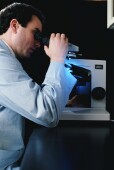
WEDNESDAY, Dec. 30 (HealthDay News) — Certain types of chemotherapy can damage the heart while thwarting cancer, a dilemma that has vexed scientists for years. But a new study in rats finds that injecting the heart with stem cells can reverse the damage caused by a potent anti-cancer drug.
The findings could one day mean that cancer patients could safely take higher doses of a powerful class of chemotherapy drugs and have any resulting damage to their hearts repaired later on using their own cardiac stem cells, the researchers said.
The study was published online Dec. 28 in advance of print publication in the journal Circulation.
Doxorubicin is a common chemotherapy drug used to treat many types of cancer, including breast, ovarian, lung, thyroid, neuroblastoma, lymphoma and leukemia.
But the drug can have serious side effects, including heart damage that can lead to congestive failure years after cancer treatment ends.
In the study, researchers removed cardiac stem cells from rodents before chemotherapy. The stem cells were isolated and expanded in the lab.
Rats were then given the chemo drug doxorubicin, inducing heart failure. Afterward, the rats’ stem cells were re-injected into their hearts, and the damage was reversed.
“Theoretically, patients could be rescued using their own stem cells,” said study author Dr. Piero Anversa, director of the Center for Regenerative Medicine at Brigham and Women’s Hospital in Boston.
A Phase 1 clinical trial using a similar procedure in people is already under way, said Dr. Roberto Bolli, chief of cardiology and director of the Institute of Molecular Cardiology at the University of Louisville in Kentucky, who is heading the trial.
His lab has U.S. Food and Drug Administration approval to treat 30 patients who have heart failure from cardiovascular disease, not chemotherapy.
In the trial, participants’ cardiac tissue will be harvested, the stem cells isolated and then expanded in vitro from about 500 cells to 1 million cells over several weeks, Bolli explained. Several months after the patient has undergone bypass surgery, the stem cells will be re-injected.
Researchers believe the stem cells can differentiate into new heart muscle and blood vessel cells. In addition, the stem cells release cytokines, substances that stimulate the heart’s internal repair system, Bolli said.
The clinical trial is still enrolling participants, and it’s too soon to tell how patients who have had the procedure are faring, Bolli said.
For cancer patients, doxorubicin and other medications in the class of chemotherapy drugs called anthracyclines, can be potent tumor fighters. However, oncologists often must limit doses because of the risks to the heart, Anversa said.
If future research shows the stem cell procedure is safe and effective in people, it could one day mean doctors could give higher doses of chemotherapy drugs, knowing that if stem cells are harvested, there is the ability to repair damage to the heart down the line.
“For people, this could potentially be a very important development,” Bolli said. “Doxorubicin is a very effective anti-cancer drug, but the use is limited by the toxicity. If this issue can be overcome, it would be a major leap forward for anti-cancer therapy.”
More information
The National Cancer Institute has more on doxorubicin and heart risks.

